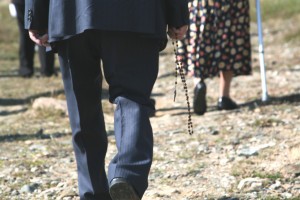The Emerging Church
What do you get when you mix a dash of pub culture, a splash of irreverence, a healthy dose of conversation, a smattering of postmodernist critique, a drizzle of discourse on problematic concepts such as ‘religion’ and ‘the secular’, and a host of other eclectic and idiosyncratic ingredients to taste? Depending upon the measures, one possible outcome could be an ideal-typical podcast from your friends at The Religious Studies Project. Prepare in a slightly different manner and your culinary exploits could produce a manifestation of the Emerging Church. However, in the case of the latter, similar results might be obtained from a completely different set of ingredients.
The Emerging Church Movement (ECM) is notoriously difficult to define. What are scholars of ‘religion’ to do with a trend seemingly emerging both within and without many contemporary manifestations of (Western) Christianity, that is both anti-institutional and ecumenical, aims to avoid hierarchies and power structures, embraces creativity, deconstruction and experimentation, and actively promotes a ‘neutral’ and ‘non-judgmental religious space’ where almost anything goes? In this week’s podcast, Chris is joined by Dr Gladys Ganiel to discuss this ‘problematic’, important and boundary-pushing phenomenon.
In The Deconstructed Church: Understanding Emerging Christianity (Oxford, 2014), Ganiel and co-author Gerardo Marti write:
“We define Emerging Christians in terms of sharing a religious orientation built on a continual practice of deconstruction. We characterize the ECM as an institutionalizing structure, made up of a package of beliefs, practices, and identities that are continually deconstructed and reframed by the religious institutional entrepreneurs who drive the movement and seek to resist its institutionalization. As such, the ECM is best seen as a mix of both reactive and proactive elements, vying for the passion and attention of Christians and nonbelievers. Emerging Christians react primarily against conservative/evangelical/fundamentalist Protestantism but also against other forms of traditional Christianity that they have experienced as inauthentic. At the same time, they proactively appropriate practices from a range of Christian traditions [...] to nourish their individual spirituality and to enhance their life together as communities.” (25-26)
What is it that makes this movement ‘Christian’? What does it do to traditional understandings of ‘religion’ and ‘secularization’? How does one research such a seemingly diffuse and unbounded phenomenon? Is it only a matter of time before this movement undergoes a process of systematization? These questions and more form the basis of a discussion which took place in May 2014, at the Irish School of Ecumenics, Trinity College Dublin in Belfast, a couple of days after the 3rd Annual Conference of the Irish Society for the Academic Study of Religion.
You can also download this interview, and subscribe to receive our weekly podcast, on iTunes. If you enjoyed it, please take a moment to rate us. And remember, you can use our Amazon.co.uk, Amazon.ca, or Amazon.com links to support us at no additional cost when you have a purchase to make.
Witchcraft and Demonic Possession in Early Modern England
Although accounts of witchcraft and demonic possession can be found from virtually all cultures around the world, in the wake of the Reformation and the European wars of religion in the fifteenth century, accusations of witchcraft and instances of demonic possession reached fever pitch. This was particularly the case in early modern England.
Philip Almond discusses such phenomena not by providing any "slick" answers which explain them in simple sociological terms, but by looking at the "familiar cultural script" that played out in most instances of possession, and by keeping in mind the broader social context in which accusations of witchcraft were made (including the "strategic interests" of many accusers).
This interview is a distillation of Professor Almond's recent publications on religious history in early modern England, and also includes discussion of his newly released work: The Devil: A New Biography.
You can also download this interview, and subscribe to receive our weekly podcast, on iTunes. If you enjoyed it, please take a moment to rate us. And remember, you can use our Amazon.co.uk, Amazon.ca, or Amazon.com links to support us at no additional cost when you have a purchase to make.
Studying “Non-Ordinary Realities”: A Roundtable Discussion
Bettina Schmidt and David Wilson organised a series of panels at the 2014 BASR Conference in Milton Keynes on the topic of "Studying Non-Ordinary Realities", as part of the conference's "Cutting Edge" sub-theme. We managed to make time to get Bettina and David, along with panel participants Fiona Bowie and RSP editor Jonathan Tuckett, to sit down to record a session with David Robertson (here, and part 2 here).
Bettina begins by outlining the aims and scope of the sessions, in which they hoped to bring together anthropologists, ethnographers and Religious Studies scholars with many different methodologies for looking at encounters with the non-ordinary. Fiona Bowie outlines her methodology for these kinds of studies, empathetic engagement, in which issues of ontological truth are set aside, but not 'explained away'. She argues that such experiences may be at the root of "religious experience", and are thus vital to the field. Davids Wilson and Robertson discuss whether the transformative nature of these experiences is epistemological at core. Remembering our critical approach, however, Jonathan challenges the emerging consensus that different methodologies require different epistemological postulates to be made sense of. It gets fairly heated.
You can also download this interview, and subscribe to receive our weekly podcast, on iTunes. If you enjoyed it, please take a moment to rate us. And remember, you can use our Amazon.co.uk, Amazon.ca, or Amazon.com links to support us at no additional cost when you have a purchase to make, whether it is religious studies related or not. Remember, the holidays are coming...
Geographies of Religion and the Secular in Ireland
The island of Ireland has, over the past weeks and months, become the site for a number of Religious Studies Project events, from our recent podcasts on Religion and Memory and The Emerging Church, to Chris’s recent gig representing the RSP at the European Sociological Association’s Sociology of Religion Research Network Conference. And there is plenty more to come in the coming weeks as well. But what about the island itself?
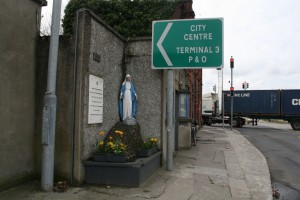
Many of us might have some notion of what ‘religion’ might mean in Ireland, but as Chris quickly discovered when speaking with Eoin O’Mahony for this week’s interview, these notions are far from the full picture. In this broad-ranging interview, O’Mahony eruditely demonstrates what geography can bring to the academic study of ‘religion’ and presents Ireland as a fascinating context within which to examine processes of boundary-making between the contested constructs of ‘religion’ and the ‘secular’. After taking listeners through a sweeping history of ‘religion’ in Ireland, O’Mahony then discusses the contextual politics of studying ‘religion’ in Ireland before exploring three different contestations over ‘religious’ and ‘secular’ place-making in Ireland.
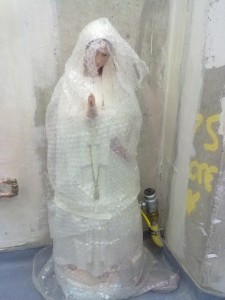
The first of these case studies concerns the maintenance practices at statues of the Virgin Mary sited on public land in Dublin city. Second, discussion turns to place-making relations at sites of pilgrimage performance. And finally, Eoin focuses upon Catholic primary schools as political sites where children are ‘made’ both as ‘Catholics’ and as ‘citizens’. Through this detailed substantive and theoretical discussion, O’Mahony presents the local and particular as a challenge to dominant and simplistic sociological narratives of ‘secularization’, problematizes simplistic divides between the ‘religious’ and the ‘secular’, ‘public’ and ‘private’, and contributes to a ‘decolonization’ of the ‘secular’ – and the study of ‘religion’ more broadly. We even manage to include a discussion of Father Ted.
Eoin maintains a blog concerning his ongoing academic journey entitled "53 degrees", and has recently published an article entitled The Problem with Drawing Lines – Theo-geographies of the Catholic Parish in Ireland in the Journal of the Irish Association for the Academic Study of Religions. He is hoping to single-handedly break the hegemony of precarious academic labour by tweeting at @ownohmanny.
If you found this podcast interesting, you might also be interested in our previous interviews with Kim Knott on Religion, Space and Locality, Alex Norman on Spiritual Tourism, and Peter Collins on Religion and the Built Environment. You can also download this interview, and subscribe to receive our weekly podcast, on iTunes. If you enjoyed it, please take a moment to rate us. And remember, you can use our Amazon.co.uk, Amazon.ca, or Amazon.com links to support us at no additional cost when you have a purchase to make, whether it is religious studies related or not. Remember, the holidays are coming…
Science and Religion in Europe: A Historical Perspective
The idea of long-running clash between the domains of "science" and "religion" has not only been central to western discourses on modernity, but has increasingly become a central supposition in the history of science itself – informing not just the rhetoric of the New Atheists, but also the broader public understanding of the issue. But is this historically accurate?
In this interview, Professor Peter Harrison (formerly Idreos Professor of Science and Religion at Oxford) outlines the flaws in this supposition by providing a historical perspective on the categories "science" and "religion" and the way that they were formerly considered separate virtues (scientia and religio) instead of incompatible domains of knowledge. Far from the current narrative being correct – often focusing on episodes such as the Church's response to the Galileo controversy – Professor Harrison explains that religious institutions were originally (and for a long time) key supporters of scientific activity, which was considered broadly as a theological attempt to unlock The Book of Nature. The middle section of the interview looks at the complex relationship between theological commitment and scientific activity from Newton to Darwin, and in the final section discusses continuing complexities of the relationship in the post-Darwinan western world, right down to problematic assumptions at play in contemporary New Atheism as well as debates about Islamic militancy.
This interview was recorded at the meeting of the Australian Religious History Association in July 2014. For those interested in the themes of the interview, the keynote talk of the RHA meeting was delivered by one of Professor Harrison's key collaborators, Ronald Numbers (on a similar topic, focusing especially on the Galileo episode). A number of related talks and interviews can be found on the CHED website.
You can also download this interview, and subscribe to receive our weekly podcast, on iTunes. If you enjoyed it, please take a moment to rate us. And remember, you can use our Amazon.co.uk, Amazon.ca, or Amazon.com links to support us at no additional cost when you have a purchase to make.
Religion and Literature
How can studying literature help us to study religion? And what the question even mean? In this interview, Alana Vincent, Lecturer in Jewish Studies at the University of Chester, sets out some of the interesting intersections of these two fields. We can glean ethnographic or historical detail from literary works, and sometimes read particular insider discourses in their pages. We can read literature as a "sacred text" - or indeed, "sacred text" as literature". Does literature, as a form where imagination is allowed free reign, provide a space for authors and readers to explore 'matters of ultimate concern', within or without religious institutions?
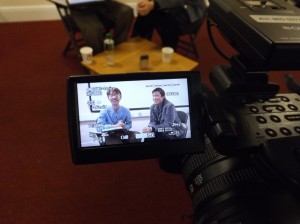 This interview was recorded LIVE! at the University of Chester on the 15th of October, 2014. Thanks to Chester and to Dawn Llewellyn for making the event possible. The interview leads directly onto the roundtable "Narrative, Ethnography and Reflexivity" which will be broadcast this Wednesday.
This interview was recorded LIVE! at the University of Chester on the 15th of October, 2014. Thanks to Chester and to Dawn Llewellyn for making the event possible. The interview leads directly onto the roundtable "Narrative, Ethnography and Reflexivity" which will be broadcast this Wednesday.
You can also download this interview, and subscribe to receive our weekly podcast, on iTunes. If you enjoyed it, please take a moment to rate us. And remember, you can use our Amazon.co.uk, Amazon.ca, or Amazon.com links to support us at no additional cost when you have a purchase to make.
Narrative and Reflexivity in the Study of Religion: A Roundtable Discussion (with video)
This week we are bringing you the fruits of a recent RSP venture to the University of Chester, UK. In the early afternoon, Chris and David ran a workshop on "Digital Humanities" for the postgraduate community in the Department of Theology and Religious Studies. Later on, David interviewed Dr. Alana Vincent in from of a 'live studio audience' on the topic of 'Religion and Literature'. Following directly on from this, Chris chaired a roundtable discussion on 'Narrative and Reflexivity in the Study of Religion' featuring Dr. Wendy Dossett, Prof. Elaine Graham, Dr. Dawn Llewellyn and Dr. Alana Vincent — all staff in TRS at Chester — and the RSP's own Ethan Quillen, of the University of Edinburgh.
The idea for this roundtable was that it would follow on directly from the interview on religion and literature, but expand the discussion to cover a variety of points relating to narrative, autobiography and (auto)ethnography in the study of religion. This was also recorded in front of a live audience, and towards the end of the recording we take questions from the floor.
Thanks to the resources available at the University of Chester — specifically, a wonderful chap named Lee — we are able to bring you this roundtable discussion in video form — something a lot of our listeners have been keen on for quite some time. Let us know what you think! We can't promise to do this very regularly, but if it is useful we will definitely investigate our options for the future.
Discussion addressed the following questions, and a lot more...
- What do we mean when we speak of incorporating narratives into Religious Studies? Why would we want to?
- What makes a narrative different from a discourse? Is there any difference?
- Does studying narrative minimize other aspects of ‘religion’ such as ritual, embodiment, symbols etc? Is there anything particularly Western or gendered about privileging narratives?
- Given that we focused upon ‘religion and literature’, what is the place of fictional narratives? What can they tell us? Are all narratives fictions? Can one infer anything external to a narrative?
- What is the place of the scholar in all of this? Are we interpreters? Are we co-creators of narratives? Do we remain outside the data we study or must we write ourselves in? What would this do to ‘objectivity’? Is the whole academic enterprise an exercise in creating narratives? Can academic reflexivity go to too far?
This podcast is presented to you as a co-production with the University of Chester, and we are very grateful for their help in making this happen — particularly to Dawn Llewellyn for organizing, and to Lee Bennett for the technical wizardry.
The Postsecular
In his 2011 Presidential Address to the Society for the Scientific Study of Religion in Milwaukee, James Beckford focused upon a contested term that has grown in prominence in recent years in the social scientific study of religion – the notion of the ‘postsecular’. In this address – published in the JSSR in 2012, Beckford noted a number of problems associated with the concept.
First, there is enormous variety in the meanings attributed to the ‘postsecular’, and there are many tensions between these meanings. Second, ‘the variety of meanings attributed to “postsecularity” is partly a function of the unusually wide range of intellectual disciplines and fields with an interest in it’. However, Beckford is keen to emphasise that this breadth of disciplinary interest does not imply that there actually is such a phenomenon as ‘postsecularity’. Third, ‘the orientation of many writings about the postsecular is normative and speculative’. (2012, 12-13)
With these issues in mind, Chris took some time to speak solely on this contested topic with Kevin W. Gray while in Belfast for the ESA Sociology of Religion Research Network Conference in September. Discussion focuses upon the history of the term, potential definitions, disciplinary and geographical differences, and ultimately suggests that ‘postsecularity’ is effectively dressing up ‘secularity’ in obfuscating clothing.
You can also download this podcast, and subscribe to receive our weekly podcast, on iTunes. If you enjoyed it, please take a moment to rate us. And remember, you can use our Amazon.co.uk, Amazon.ca, or Amazon.com links to support us at no additional cost when you have a purchase to make – particularly in the run up to Christmas!
References
- Beckford, James A. 2012. “SSSR Presidential Address Public Religions and the Postsecular: Critical Reflections.” Journal for the Scientific Study of Religion 51 (1): 1–19. doi:10.1111/j.1468-5906.2011.01625.x.
Spiritualism and Shamanism
Two firsts for the Religious Studies Project this week. Surprisingly, we've never talked about Shamanism, one of the watchwords of discourse on "indigenous religion" for scholars and laymen alike, insiders and outsiders. The term originates with the Romanian scholar Mircea Eliade, who took it from a specific group in the Tunguskee region of Russia, and applied it universally to describe individuals who communicate with spirits for the benefit of their communities. For Eliade, Shamanism was one more example of a heirophany, an interjection of an ineffable sacred into the mundane world. Unsurprisingly, however, when such sui generis notions are disregarded, and the category examined from the data up, the category ceases to be easily defined.
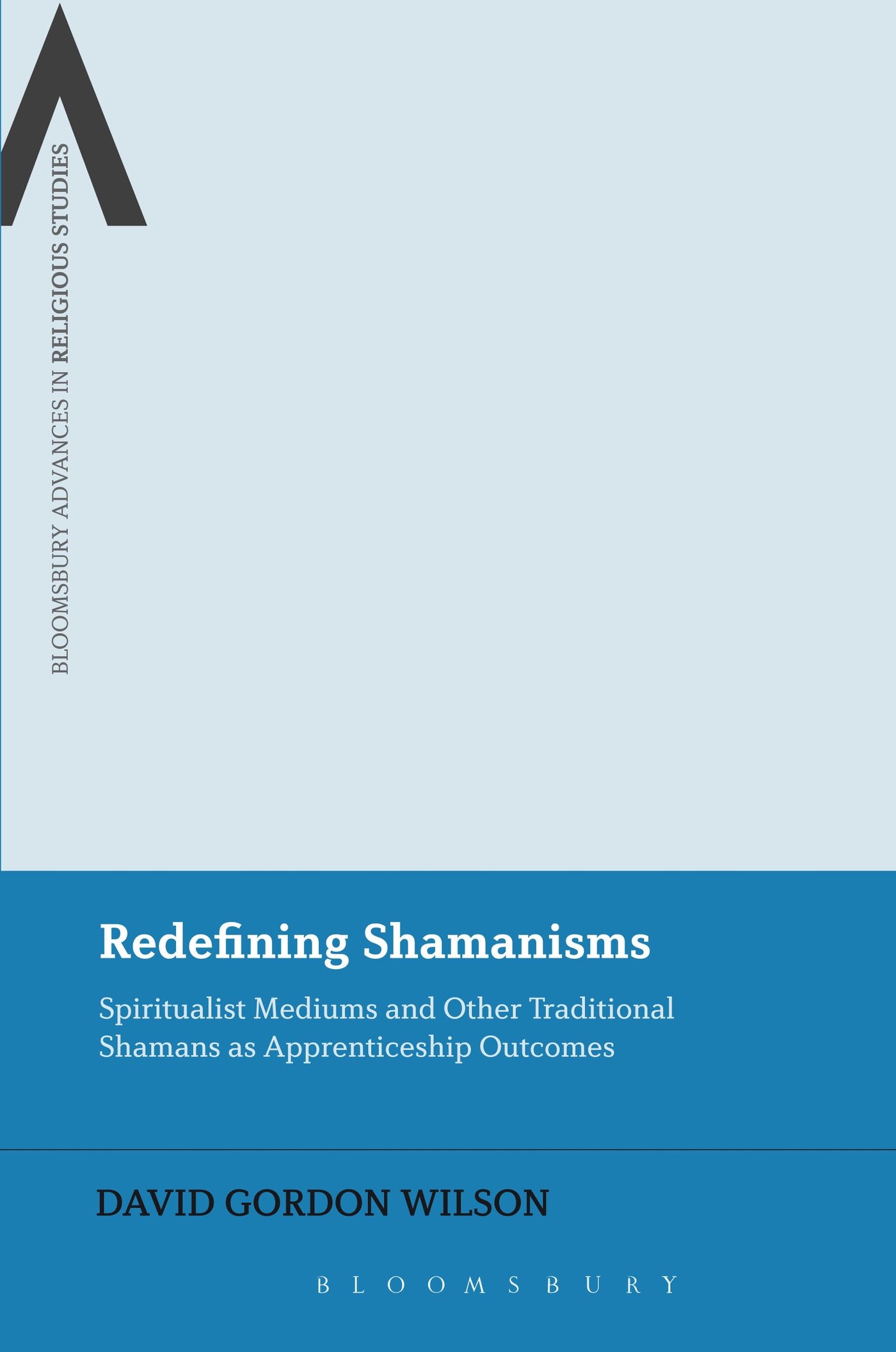 In this interview, David Wilson tells us that while studying shamanism while undertaking training as a medium in the Spiritualist Church, he noticed that both seemed to exhibit similar features; an emphasis on healing, communication with the dead, as well as other "spiritual beings", but most importantly, a pattern of training through apprenticeship. After telling us about his own experiences of training, he outlines how this pattern of apprenticeship - an initial 'calling', a process of direct training from established mediums, beginning public practise and finally acceptance by the broader community. Wilson's 'apprenticeship' model not only gives us a way to conceptualise shamanism without recourse to sui generis discourse, but draws interesting parallels between indigenous cultures and the somewhat hidden world of heterodox religious practices in the West, particularly in regards to the frequent presence of healthcare.
In this interview, David Wilson tells us that while studying shamanism while undertaking training as a medium in the Spiritualist Church, he noticed that both seemed to exhibit similar features; an emphasis on healing, communication with the dead, as well as other "spiritual beings", but most importantly, a pattern of training through apprenticeship. After telling us about his own experiences of training, he outlines how this pattern of apprenticeship - an initial 'calling', a process of direct training from established mediums, beginning public practise and finally acceptance by the broader community. Wilson's 'apprenticeship' model not only gives us a way to conceptualise shamanism without recourse to sui generis discourse, but draws interesting parallels between indigenous cultures and the somewhat hidden world of heterodox religious practices in the West, particularly in regards to the frequent presence of healthcare.
David's book, Redefining Shamanisms, is available in all formats now. You can also download this podcast, and subscribe to receive our weekly podcast, on iTunes. If you enjoyed it, please take a moment to rate us. And remember, you can use our Amazon.co.uk, Amazon.ca, or Amazon.com links to support us at no additional cost when you have a purchase to make – particularly in the run up to Christmas!
If you enjoyed this episode, the spirits tell me you may also enjoy our interview with Ann Taves on Religious Experience, our recent roundtable featuring David Wilson on Non-Ordinary Realities and our two-part collaboration with Jack Hunter on Religious Studies and the Paranormal (Part one. part two).
Prayer, Pretense, and Personification: How God becomes real
Over one hundred years ago, William James dedicated an entire chapter in The Varieties of Religious Experience to “The Reality of the Unseen”. When we typically imagine religion, we imagine that religion has to do with something perceivable, yet paradoxically something that we cannot see, taste, smell, or touch. James characterized the relationship of the individual psyche and belief in the supernatural realm as “…if there were in the human consciousness a sense of reality, a feeling of objective presence, a perception of what we may call ‘something there’…” (1985, p. 55 [emphasis in original]).
While the impulse to believe may be there, one’s relationship to this unseen realm is not easy to cultivate and maintain. Our evolved psychology was not ‘built’ with the intuition that, even though we have minds, there is an unseen - ultimate mind - that has access to our own and shares thoughts with us (Boyer, 2013). Such ideas require cultural scaffolding, and are not easily sustained in the absence of social systems. Although often ignored, “all our ethnography and history suggests that there is learning involved in the practice of religion…” (Luhrmann, 2013, p. 147). How does one learn to experience God as really real?
In her interview with Thomas Coleman, psychological-anthropologist Tanya Luhrmann discusses her multiyear ethnography of American evangelicals where she sought to understand how some of these individuals come to have close, personal, intimate relationships with God (Luhrmann, 2012). She begins by providing the background into her extensive research on the Vineyard Church movement, where she attended sermons, house groups, prayer groups, and many other opportunities to understand evangelicals, specifically, how God becomes real for them. Luhrmann details the rise of evangelicals in the 60’s and 70’s, and how anthropological work can be informed by evolutionary psychology. This serves as a framework to understand the unique training processes that teach an individual that their mind is not only open to their own thoughts, but God’s as well. Luhrmann goes beyond a purely explanatory endeavor and is interested in understanding the processes that lead some to see God as “a person among people”. One aspect of this learning process, she found, involves pretense and instructs the individual to treat God as an imaginary friend, but with one caveat – God (to them) is real and imaginary friends are not.
Furthermore, while imagining God, Luhrmann uncovered that the individual is often instructed to treat God as they would another person, like a close friend you tell your secrets to. This helps to cultivate an understanding and experience of God that is highly anthropomorphic and cognitively pleasing, rather than thinking of God as Aristotle’s “unmoved mover”, who would hardly be interested in your innermost thoughts. In closing, she details some of the prayer exercises that further help individuals to develop this personal sense of divine presence and answers an RSP listener's question about the possibility of gender differences in experiencing the divine.
You can visit Dr. Luhrmann’s website to find out more about her work and research at: http://luhrmann.net/
You can also download this interview, and subscribe to receive our weekly podcast, on iTunes. If you enjoyed it, please take a moment to rate us. And remember, you can use our Amazon.co.uk, Amazon.ca, or Amazon.com links to support us at no additional cost when you have a purchase to make.
Citations
- Boyer, P. (2013). Why “belief” is hard work Implications of Tanya Luhrmann’s When God talks back. HAU : Journal Of Ethnographic Theory, 3(3), 349-357.
- James, W. (1985). The varieties of religious experience (Vol. 13). Harvard University Press.
- Luhrmann, T. M. (2012). When God talks back. New York: Alfred A. Knopf.
- Luhrmann, T. M. (2013). Building on William James: The role of learning in religious experience. In D. Xygalatas & W. McCorkle Jr., Mental Culture: Classical Social Theory and the Cognitive Science of Religion (pp. 145-163). Durham: Acumen.



